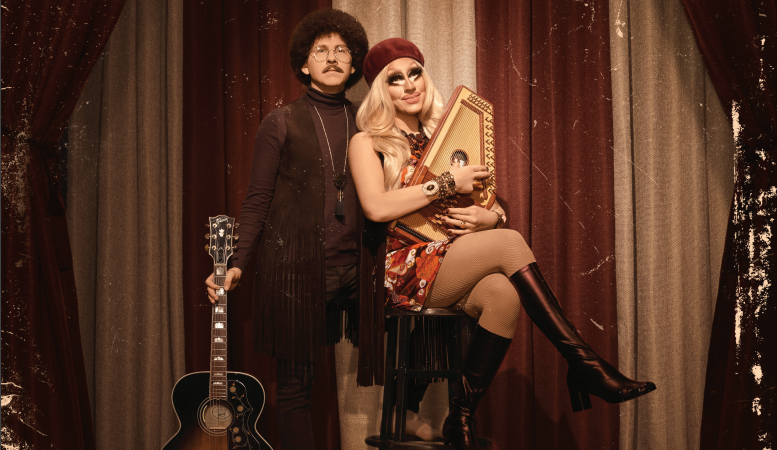Interview: Dominique Cardona and Laurie Colbert
5 min read
Following its closing of the 2013 LGBT BFI London Film Festival we get caught up in the anticipated release of Margarita on November 25th by catching up and chatting with the film’s directors Dominique Cardona and Laurie Colbert.
Florence Hinton-Collyer: How would you pitch your film?
Dominique Cardona and Laurie Colbert: Margarita is best defined as a dramedy. It deals with important social and political issues, but with warmth and humour. It’s the story of an undocumented worker (a nanny) and her struggle to retain a sense of self in an environment where she can easily be taken for granted and disempowered.
The film is also an exploration of the political (and self-imposed) boundaries that are placed on love.
FHC: What do you hope for the audience to take away having watched your film?
DC & LC: Ideally, we want viewers to question their own relationships with friends, lovers and employees – to recognize when there is an imbalance of power based on race, background or some other immutable difference. It’s often easier to make assumptions about someone’s life than it is to really examine and seek to understand his or her experience.
FHC: Why is Margarita’s story one that needs to be told?
DC & LC: We feel it’s important to tell stories that challenge our perception of what it is like to be an immigrant worker (illegal or otherwise). Class struggles exist in our ostensibly class-free society and, whether it’s intentional or not, it’s easy for an imbalance of power to develop in a situation like Margarita’s.
Margarita struggles to create a family for herself – to simply be valued in the same way that she values those around her. But, class distinctions and social ignorance seem to always be in the way of true fulfillment. Why this is so often the case is an important discussion to have.
FHC: How would you describe the relationship between Margarita and Jane?
DC & LC: Margarita is a woman who doesn’t see social barriers to love, whereas Jane is somewhat constricted in her ability to love because of her imposed notions of class and propriety. As Jane comes to terms with her love for Margarita, she awakens to the truth about her own biases and learns to follow her heart.
Like most young relationships, theirs is full of passion, but they quickly learn that that is not enough to sustain it if their love can’t be open and unconditional.
FHC: What do you think of Margarita’s morals regarding her omission of her actual immigration status?
DC & LC: Margarita behaves as any disempowered illegal immigrant might in the same situation – she keeps her immigration status under wraps and gets on with her work. We don’t see this as a moral issue. It’s more a survival issue and one that highlights unrealistic immigration policies in the U.S. and Canada as well as the suppression of alternative lifestyles in other countries.
The question has been asked, why did she not at least tell the woman she loved. It’s hard to say what motivated that decision, but Margarita is perpetually in self-preservation mode, which affects her ability to trust even those closest to her. An audience member once suggested to us that Jane didn’t want to know. Not knowing was another opportunity to keep the relationship in a kind of “limbo” where Jane was comfortable.
FHC: It’s important that views on race and hierarchy are challenged, how does Margarita do this?
DC & LC: Class and hierarchy are arguably more insidious forms of racism. Margarita, who is a proud, open lesbian Mexican woman does not face overt racism in Canada. The family she works for are ostensibly liberal, socially conscious Canadians, but, at the same time, are ignorant (or at least willfully blind) to the fact that they are oppressing Margarita simply by failing to see the reality of her life. For them, Margarita’s real life struggles are merely anecdotal. It’s metaphoric that she lives in the basement despite the fact that she is the driving force behind the successful day to day operation of the household.
FHC: Do you think it’s right that individuals should be so constrained by external laws and forces?
DC & LC: We believe there is a certain irony in the fact that immigration policies are consistently being tightened in a country whose economy was built (albeit forcefully – that’s another story) by immigrants. And, obviously, as lesbians from different countries (Dominique is a French national, Laurie is Canadian) who were forcibly separated more than once by political bureaucracy, we will continue to tell stories that support every person’s right to live and love without boundary.
FHC: How was it working together to direct this feature?
DC & LC: Wonderful! We have been collaborating now for 22 years (our first documentary “Thank God I’m a Lesbian” was released in 1993). Over that time, we’ve developed a kind of shorthand that makes working together a real joy. We disagree (often, to be honest), but that always makes the end product more interesting and we’re very militant about leaving our disagreements at home and bringing a united energy to the set. Filming “Margarita” was a wonderful experience. We had a fantastic cast, crew and co-writer. We feel blessed to have been able to produce a very low-budget feature that was fun to make and has been very well-received.
FHC: Do you have any advice for directorial collaboration?
DC & LC: In a word – planning! We make sure that everything is planned before each shoot so that there is no conflict to disrupt the creative process of the crew and cast. Beyond that, casting the right actors is vital – find a casting director with experience and one you work well with.
FHC: What’s next for Dominique Cardona and Laurie Colbert?
DC & LC: We’re currently in pre-production of a feature to be shot in northern Canada next summer. The film is a psychological thriller adapted from a stage play by Jane Martin. This will mark the first time that we have a adapted an existing story – a new challenge that we are looking forward to.



